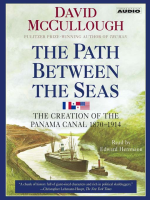 On March 8 at 1:30. we will discuss a first-rate drama of mobilization and diplomacy “not unlike that of war.” When fifteen years of struggle by Suez veteran Ferdinand de Lesseps to build a canal through the Panamanian isthmus collapsed through tropical disease, logistical barriers, and financial disgrace, two Americans managed literally superlative accomplishments: moving billions of cubic yards of dirt, harnessing one of the world’s most savage rivers, developing an unprecedented lock and electrical system, and, not least, defeating the Anopheles mosquito. In an open, vigorous style, author David McCullough contrasts the manic-depressive attitudes of French and American populations and leaders toward the canal with the cool perseverance of his two heroes: the engineer John Stevens, a former common laborer who took charge of the collapsing canal project and realized that the problem was not digging but transportation; and Dr. William Gorges, who conquered malaria and yellow fever in a region where hospital rooms used to literally shake from patients’ chills.
On March 8 at 1:30. we will discuss a first-rate drama of mobilization and diplomacy “not unlike that of war.” When fifteen years of struggle by Suez veteran Ferdinand de Lesseps to build a canal through the Panamanian isthmus collapsed through tropical disease, logistical barriers, and financial disgrace, two Americans managed literally superlative accomplishments: moving billions of cubic yards of dirt, harnessing one of the world’s most savage rivers, developing an unprecedented lock and electrical system, and, not least, defeating the Anopheles mosquito. In an open, vigorous style, author David McCullough contrasts the manic-depressive attitudes of French and American populations and leaders toward the canal with the cool perseverance of his two heroes: the engineer John Stevens, a former common laborer who took charge of the collapsing canal project and realized that the problem was not digging but transportation; and Dr. William Gorges, who conquered malaria and yellow fever in a region where hospital rooms used to literally shake from patients’ chills.
Ironically, it was the often jingoistic “Manifest Destiny” rhetoric and the medical experience of the brutal Spanish-American War that provided Congressional backing and scientific leads for the Panama task. A further twist was the origin of the Panamanian republic which permitted the canal to go through: French adventurer Phillippe Bunau-Varilla executed a coup against Colombia in 1903 for “the greater glory of France,” then, according to McCullough, promptly put the new nation and its treasury under the wardship of the U.S. State Department and the House of Morgan, respectively. Meanwhile, viewing the French example, Congress so feared possible graft in Panama that it threw horrific red tape around the canal project. But Stevens was able to recruit the greatest engineering minds of the period – and the book is able to recapture their breakthroughs.
